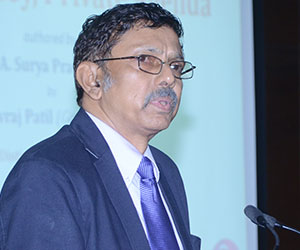“You must be the change you wish to see in this world. As human beings, our greatness lies not so much in being able to remake the world – that is the myth of the atomic age – as in being able to remake ourselves”. The report of the Second Administrative Reforms Commission (ARC) on Ethics in Governance begins with this quote from Mahatma Gandhi.
At first glance this quote from the Mahatma would seem like a routine cut and paste job by a hack who is burdened with the task of churning out a commission report.
But, those who go beyond the cover page soon realize that a lot of thinking and effort has gone into the writing of this report. Among the 14 reports submitted by this commission to the government, which was headed by Mr.Veerappa Moily, who is currently the Law Minister, the report on Ethics in Governance should be of particular interest to all those who clamour for an ethical framework for politics in the country. The commission, while taking cognizance of the salutary measures introduced in recent years at the prompting of the Supreme Court and a pro-active Election Commission, has made a host of recommendations to usher in stability and accountability in the field of politics. While endorsing measures like disclosure of antecedents of candidates in elections and strict supervision of electioneering, it has suggested partial state funding of political parties, amendment of the Representation of the People Act, 1951 to disqualify candidates facing charges related to grave and heinous offences and corruption, appointment of a collegium to select election commissioners and a constitutional amendment to lend stability to coalition governments.
The need for a serious look at administrative reforms was felt by the ruling United Progressive Alliance (UPA) when it entered office in 2004. Some recent pronouncements by the government raise the hope that some, if not all, of the commissions recommendations will be implemented soon. The Prime Minister Dr.Manmohan Singh, who has often emphasized the need for administrative reform, made it a point to refer to the reports of the Second ARC during his Independence Day speech last year. He told the nation that his government proposed to “act with speed” on the recommendations of the commission. Later, the government informed the Rajya Sabha that the recommendations of the commission were “under active consideration” of the government.
Like the first ARC that looked at the entire gamut of administration four decades ago, the second ARC too has done a fairly exhaustive analysis of the strengths and weaknesses of
the political system and its impact on governance. More importantly, unlike other commissions of inquiry whose reports reek of officialese, the ARC has adopted a fresh, reader friendly approach to report writing, summation of recommendations and pagination that is worthy of emulation in every department of government.
The commission’s recommendations vis-à-vis political defections are note worthy.
In the absence of a law prohibiting defections of legislators from one political party to another, the problem of defections assumed monstrous proportions in many states by the mid-1960s. As the Congress Party’s vote share in elections began to decline and regional parties emerged on the scene, political horse-trading became the order of the day. Any party which fell short of a majority in a legislature got down to purchasing the allegiance of legislators of rival parties. The union government took the first major step to end the menace two decades ago when Rajiv Gandhi was prime minister. Parliament amended the Constitution and incorporated an anti-defection law as the Tenth Schedule. This law prohibited defection of individual legislators but legitimized splits in political parties provided one-third of the members of a political party in a legislative chamber broke away from the main party to form a separate group. It also permitted merger of political parties whenever two-third of the members of a party in a legislative chamber endorsed its merger to another party. These provisions put an end to defection of individual legislators but did not bring in political stability because of the ingenuity of politicians to outsmart legal draftsmen. Since the anti-defection law prohibited “retail trade”, every political party in need of extra support in legislatures began splitting rival parties and encouraging wholesale defections. Parliament plugged this loophole with the passage of the Constitution ( 91 Amendment ). These changes, which came into effect in July, 2004, prohibited party splits, banned defections and prevented defectors from being rewarded with ministerial berths or other remunerative political posts.
The 91 Amendment also dealt with another key issue. It met the long standing demand for imposing a cap on the size of ministries both at the Centre and in the states. The ceiling on the size of ministries was suggested by the first Administrative Reforms Commission in the 1960s. This amendment has prohibited party splits but it has not addressed the issue of unstable coalitions because the law does not take cognizance of coalitions and pre-poll electoral adjustments among political parties.
The Second Administrative Reforms Commission has therefore suggested that something more needs to be done vis-à-vis the integrity of coalitions. It says that the ethics of coalition government is “seriously strained” when parties in a coalition, “primarily driven by opportunism and craving for power in utter disregard of the common minimum programme” desert the coalition mid-stream. It therefore wants the opportunistic redrawing of coalitions between elections to be legally prohibited. This prohibition can be imposed through a constitution amendment which says that “if one of more parties in a coalition with a common programme mandated by the electorate either explicitly before the elections or implicitly while forming the government, realign midstream with one or more parties outside the coalition, then members of that party or parties shall have to seek a fresh mandate from the electorate”. This proposal takes the anti-defection law further because it takes into account the problem of mid-stream instability of coalitions when a coalition partner decides to switch sides. Since Mr.Veerappa Moily, the Chairman of the commission, hails from Karnataka, he certainly has first-hand knowledge of the danger that unstable coalitions can pose to the democratic process and to governance. Some years ago, the Congress Party teamed up with the Janata Dal (S) to form a coalition government in that state. The Janata Dal(S) abruptly terminated this coalition after 20 months and teamed up with the Congress Party’s arch rival – the Bharatiya Janata Party (BJP) - to form another unprincipled coalition. Also, the Congress Party cohabits rather uneasily with political parties like the Nationalist Congress Party in Maharastra and at the Centre. The BJP, which is the main opposition party in Parliament, has had its share of problems with slippery coalition partners. The latest is the uneasy relationship that this party has with the Jharkhand Mukti Morcha (JMM) in Jharkhand. Though the two main communist parties have succeeded in forming more ideologically compatible and viable coalitions in West Bengal, Kerala and Tripura, they are unlikely to oppose measures that lend stability to coalitions at the national and regional level. Therefore, the government should be able to muster the support of major political parties if it were to decide to implement the ARC’s recommendation in this regard. Several other recommendations of this commission pertaining to ethics in politics should elicit support across the political spectrum.
The appointment of the commission by the United Progressive Alliance (UPA) and the terms of reference given to it spoke of the government’s good intentions. Now that the commission has completed its labours, these intentions need to be translated into action. Since the prime minister has himself evinced interest in reforming the system in order to bring in transparency and accountability, there is reason to hope that the good work done by the commission will not go waste. It appears someone at least is paying heed to the words of Mahatma Gandhi that the commission so thoughtfully printed on the cover page of its report.










Post new comment